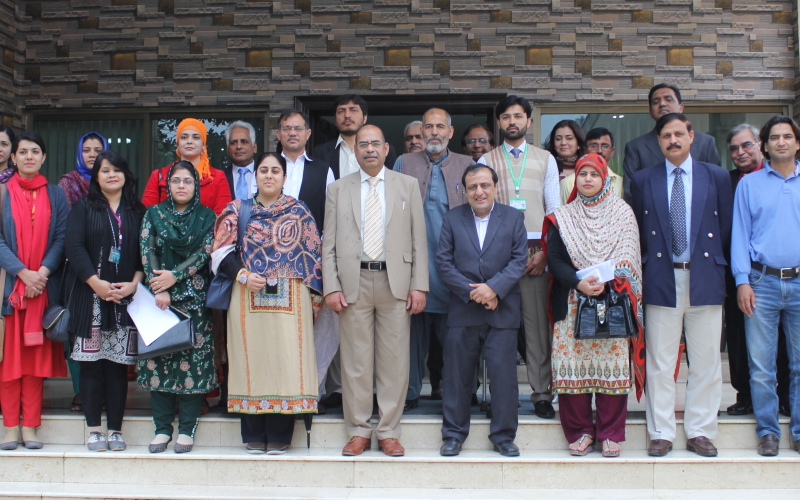By Rimsha Ali Shah.
“Would you call a person disabled if they are unable to read in a room that is pitch black?”
Or would that be an external limitation?
Can we define what is “normal”?
If not, how can we define “disability”?
Atif Sheikh, founder of Special Talent Exchange Program (STEP) and an alumnus of the International Visitors Leadership Program (IVLP) on Disability Leadership, provoked the audience of education officials to reflect on what actually constitutes disability with his compelling questions. The education management professionals were gathered at the Higher Education Commission (HEC) in Islamabad to discuss disability inclusivity at higher education institutes across Pakistan. Participants hailed from the top universities of Pakistan, including Comsats Institute of Information Technology (CIIT), National University of Science and Technology (NUST), Iqra University, Fatima Jinnah Women University (FJWU), Allama Iqbal Open University (AIOU), Lahore University of Management Sciences (LUMS), National University of Modern Languages (NUML), and other leading universities.
Sheikh’s project “Making Higher Education Inclusive” aimed to sensitize decision makers from the HEC and universities on disability equality. This program was made possible with the help of an alumni small grant from the Pakistan-U.S. Alumni Network (PUAN). All alumni of various U.S. government sponsored exchange programs in Pakistan are eligible to apply for the grant of up to 5,000 USD to enable them to give back to their communities.

USEFP ED, Rita Akhtar, discusses the dire need for inclusive education in Pakistan
Through consultative meetings at the federal and provincial levels, Sheikh touched upon how structures and systems – environmental, attitudinal, communication, and legislative – contribute to the lack of inclusivity for persons with disabilities, particularly in higher education. Addressing the stakeholders, United States Educational Foundation in Pakistan (USEFP) Executive Director Rita Akhtar said, “We have a lot to gain by working towards inclusion of persons with disabilities. It is our loss if we cannot fully integrate them into our social structures.”
Success Stories of Disability Inclusive Education from HE Institutes
Mahvish Shahzadi, Assistant Registrar – Human Resource Development at FJWU raised the question, “How can we facilitate inclusion of persons with sight disability at higher education institutes?” This question was addressed by Hasan Tareen from Lahore University of Management Sciences (LUMS) who introduced the first assistive technology center of its kind in Pakistan at LUMS. Being visually impaired himself, Tareen shared how assistive technology helped 30 visually impaired students (including two who are completely blind) access higher education at LUMS. With his laptop customized to suit his requirements, his example shines light on creating enabling environmental and technological structures for persons with disabilities. “My dream is to arrange a conference in 2016 on assistive technology through which I can sensitize different stakeholders on the advantages of such a technology,” Tareen said.

Consultative meeting at IoBM, Karachi.
The consultative sessions addressed a range of disabilities, including physical and mental disabilities, along with the financial constraints and legal barriers that come in to play while establishing disability-friendly systems. Participants discussed the significance of designing structurally inclusive buildings, similar to the Institute of Business Management (IoBM) in Karachi and University of Management Technology (UMT) in Lahore, as a necessity to promote disability equality. Dr. Abdul Hameed, Dean of the School of Social Sciences at UMT highlighted how through the Disability Resource Center (DRC) established at UMT, they were working towards providing the 25 enrolled persons with disabilities an environment conducive to learning, made possible with assistive technologies, interpreters, and structural enablers in place.
Similarly, Dr. Irfan Hyder, Dean of IoBM, stressed the need to not only focus on the tangible, but also on the social support system, which he described as the most effective enabler for inclusion. Quoting an example of a student who was paralyzed in an accident, Dr. Hyder said “IoBM provided the appropriate social support system in addition to a disability-friendly campus structure, which allowed the student to take advantage of a 100% scholarship for his undergraduate degree.”
Participants Discuss Recommendations for Disability Inclusivity
Disability rights activist Abia Akram, who is also an alumna of the IVLP on Disability Leadership, recommended higher education institutes introduce coursework on disability for all.
Mehnaz from Iqra University added, “Community service should be made mandatory right from secondary school to break attitudinal barriers towards persons with disabilities.”
Tayyaba Hanif from CIIT pointed towards the lack of research and projects that address and understand the needs for students with dysgraphia and dyslexia in Pakistan. “Parents also need to be made equal stakeholder in this process,” she added.

Consultative meeting at HEC, Islamabad
The project “Making Higher Education Inclusive” included consultative meetings with institutions that already implement inclusive models for persons with disabilities, including IoBM, Government College Lahore, LUMS, UMT and programs such as Deaf Reach, which has introduced a standard sign language manual for Pakistan. At the conclusion of the program, Sheikh and his colleagues will submit to the HEC a set of recommendations detailing the process of integrating persons with disabilities in higher education.
As Atif Sheikh said, “It is now time to redesign our policies and uphold our promise to promote disability equality.”

